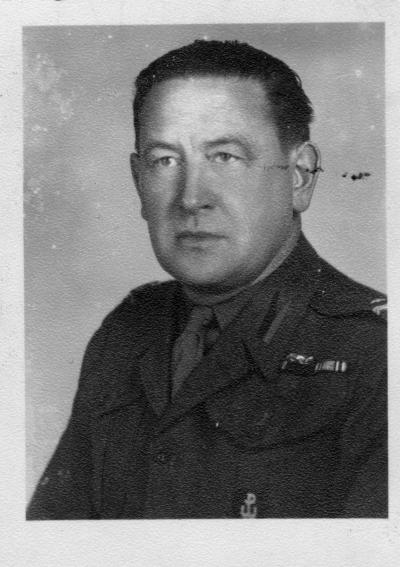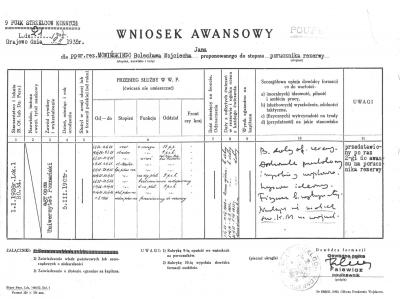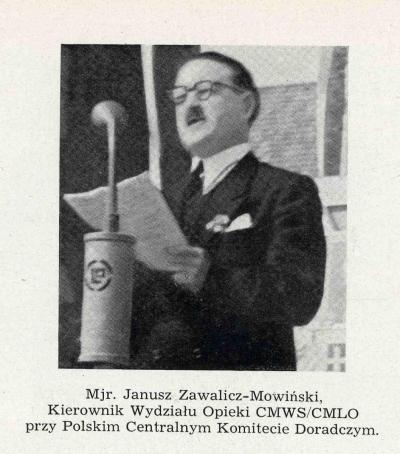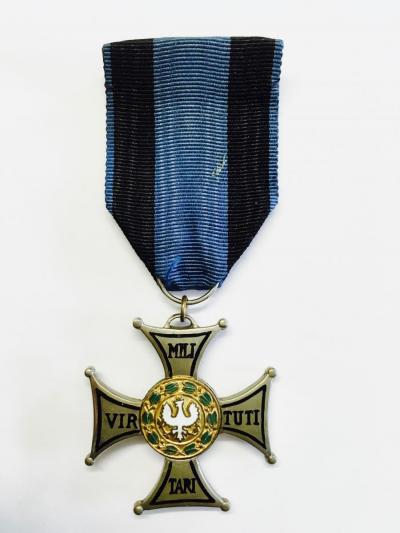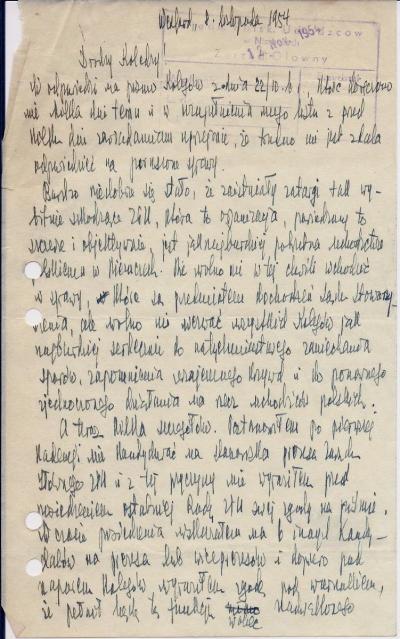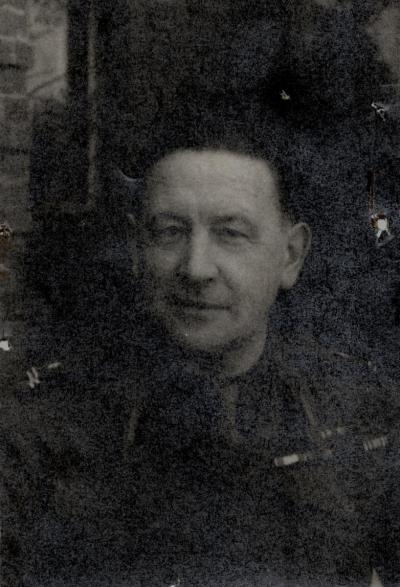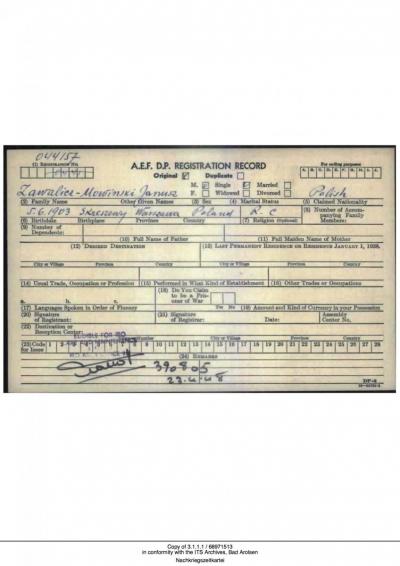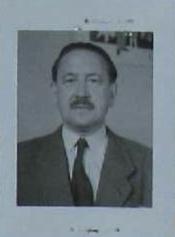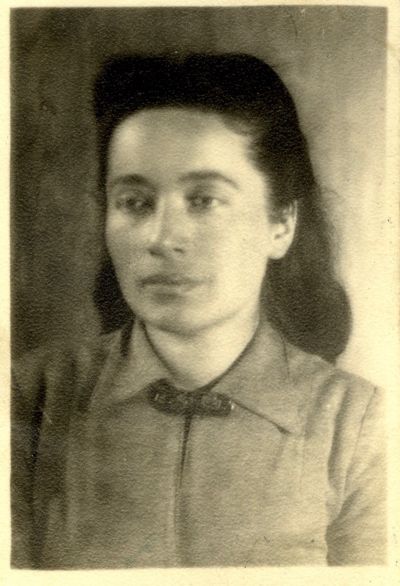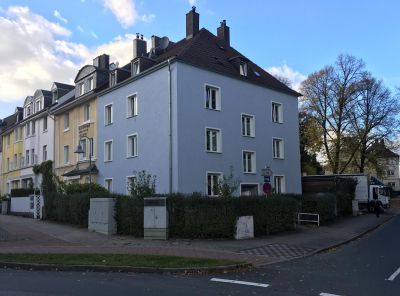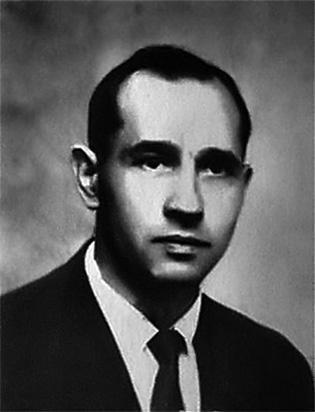Bolesław Zawalicz-Mowiński
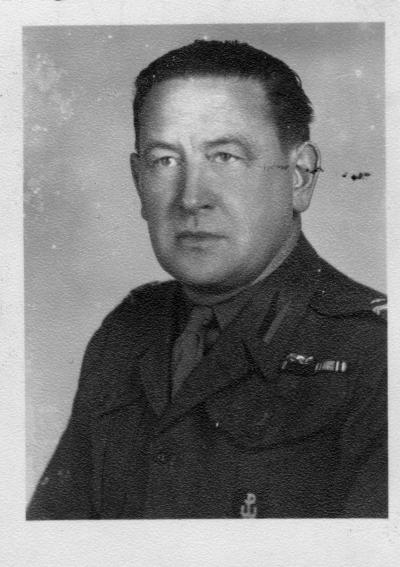
Colonel Dr Bolesław Zawalicz-Mowiński (1903–1993), pseudonym “Zawalicz”, “Gończ”, “Witold”, “Stef” and “Dyrektor”.
I. The interwar period
Bolesław Zawalicz-Mowiński was born on 5 June 1903 in the small town of Skrzeszewo in the district of Kartuzy. He spent his childhood on his parents’ estate and they ensured that he was given a good education. He later became involved in the independence movement in his homeland within the framework of the Polish Military Organisation (Polska Organizacja Wojskowa, POW) in Włocławek, for which he was awarded the Independence Medal and the Badge of Honour of the Pomeranian Front. At the beginning of 1920, he joined the squadron of the First Krechowce Uhlan Regiment. He interrupted his military service in favour of completing his school-leaving examination. After graduating, he was drafted into the 25th Uhlan Regiment in whose ranks he took part in the Polish-Soviet War. As a result of the wounds he suffered there, he left his unit and returned home. For his involvement in the fighting, he was awarded the 1918–1920 War Medal – For the Defenders of Poland.
Once recovered, he decided to study agricultural sciences. In Poznań, he completed a one-year traineeship before continuing his studies in Königsberg and Bonn. After some time, he broke off his degree and was enlisted by the Polish army. In 1923, he was assigned to the mounted infantry regiment and then detached to the cavalry’s officer cadet training college in Suwałki. Upon completion of his training, he was promoted to officer cadet and became a platoon leader. In 1924, he was seconded to the Polish Army Reserve. Back in civilian life, he continued his degree, finally completing it in Königsberg in 1926. He then took over the management of the family’s estate. After two-year’s practical training, he presented his PhD thesis and was awarded the title of Doctor of Engineering in Agricultural Sciences. In the interim, he took part in reserve drills, which saw him promoted again to officer cadet sergeant and finally, in 1928, to the rank of officer – he became second lieutenant of the reserve.
In 1929, he decided to move away from Skrzeszewo, the town in which he was born, and move to Trzemeszno in the Mogilno district where he had acquired an estate. At his new place of residence, he got involved in social causes in farmers’ associations, in the Reserve Officers Association and in the Organisation for National Unification (Organizacja Zjednoczenia Narodowego, OZN) in Mogilno.
In the meantime, he had been promoted again and was now first lieutenant of the cavalry reserve. Notwithstanding this, he held the position of Municipal Commissioner of Trzemeszno from 1937 to 1938 and, what is more, in 1938 he ran for a parliamentary seat in the 5th parliamentary term of the Sejm as an independent candidate – farmer from District 99 Inowrocław. He also contributed to the editorial team of the weekly newspaper “Kosynier”, which was published within the confines of the municipality. He played an active role in the initiation of agricultural districts in the Greater Poland region and emerged as a “pioneer” of the Polish village. Also in 1938, he took part in the festivities of the Air and Gas Defence League (Liga Przeciwlotnicza i Przeciwgazowa, LOPP) in Trzemeszno, during which he organised a rally to remember the occupation of the Olsa region. At the beginning of 1939, he decided to resume active military service. After completing his training, he was promoted to captain of the cavalry reserve.
II. The war
From the moment Germany invaded Poland in September 1939, Zawalicz-Mowiński was actively involved in the defensive war. During the hostilities, he was wounded and admitted to hospital from which he absconded. At the beginning of November 1939, he reached the area around Warsaw where he reported to the safe house of Jan Sokołowski (code name of Colonel Stefan Rowecki, pseudonym “Grot”, future commander of the Home Army). From Sokołowski he received further instructions and the command to take up underground activities. And so began a new phase of activities for him in occupied Poland. During this period, he used several pseudonyms: “Zawalicz”, “Gończ”, “Witold”, “Stef” and “Dyrektor”. Shortly after being sworn in, he was involved in the creation of underground frameworks within the Warsaw district of the Union of Armed Struggle (Związek Walki Zbrojnej, ZWZ) in the district of Sanniki. After these frameworks were reorganised, the Home Army (Armia Krajowa, AK) emerged from within the ZWZ and Zawalicz-Mowiński was seconded to the Home Army’s district command in Węgrów and Sokołów.
In July 1944, he found himself in Warsaw again. He took on an underground role as deputy commander of the emerging faction “Róg”, which was commanded by Major Stanisław Błaszczak, pseudonym “Róg”. In the wake of the insurgent hostilities, Zawalicz-Mowiński found himself highly regarded by his subordinates and by his direct superior, especially by the commander of the North Group – Colonel Karol Ziemski, pseudonym “Wachnowski”. During the German attack on the old town, Captain Zawalicz-Mowiński commanded the unit within the group that conquered and held St. John’s Cathedral. This unit accomplished this mission despite suffering great losses and despite the fact that the commander himself was wounded in the process. After recovering quickly, he recommenced his service on the front line. For his service, his courage and his leadership qualities, he was promoted to the rank of major by the commander of the insurgency and decorated with the Service Cross Virtuti Militari Fifth Class. With the whole group, he fought his way through the sewer system to Warsaw city centre (Śródmieście) and was then involved in the fighting in the Powiśle district. For this work, he was appointed deputy commander of the 36th Infantry Regiment of the Academic Legion in the 28th Stefan Okrzeja Infantry Division of the Warsaw corps of the Home Army, becoming once again the deputy to Major Błaszczak, pseudonym “Róg”. A day after the Warsaw insurgents capitulated, he was awarded the Medal of Valour by Brigadier General Antoni Chruściel, pseudonym “Monter”. On 5 October 1944, he was captured along with other military leaders and a group of soldiers from the Home Army. Zawalicz-Mowiński was initially taken to Bergen-Belsen, then to Fallingbostel and then to Groß Born. After the camp was evacuated by the Sonderkommando, he ended up in the Sandbostel camp. He regained his freedom when the British Army occupied Northwest Germany.
III. From DP to refugee (1945–1954)
For some time after being liberated, he shared the same fate as the majority of former officers in the Polish Army, former soldiers of the Home Army, prisoners of war and former inmates of the concentration camps and of the forced labourers - he found himself in a former prisoner of war camp near Lübeck. His situation changed at the end of 1945, when the authorities in London made the decision to establish military self-help on the European mainland. This went hand in hand with the promotion of Colonel Karol Ziemski to head of the Polish military district in Timmdorf near Plön with the 8th Corps of the British Army of the Rhine, BAOR. Colonel Ziemski recruited Zawalicz-Mowiński and then appointed him Chief of Staff. Zawalicz-Mowiński started using his middle name Janusz at the end of 1945. He quickly proved himself in the new role created for him by the commander. In addition to his commitment to social causes and war veterans, he also took on work with the nascent British aid divisions.
At the beginning of November 1946, at the first meeting of the Association of Polish War Veterans (Stowarzyszenie Polskich Kombatantów, SPK) in Meppen, Zawalicz-Mowiński was elected to the board. Alongside his other activities, he supported the founding of new self-help groups within the milieus of former prisoners of war in Schleswig-Holstein. One of his tasks was to create exemplary self-help departments which were supposed to speed up the development of these groups. At the beginning of May 1947, he managed to convince the British leadership to commit to the initiative to create the first divisions of the Civil Mixed Watchmen’s Service (CMWS) and the Civil Mixed Labour Organization (CMLO). Zawalicz-Mowiński started a wide-scale recruitment campaign amongst potential candidates to serve in the CMWS/CMLO in Rheda, Wentorf and Fallingbostel.
He also carried out a questionnaire survey in the camps to determine how many soldiers were looking for repatriation and how many wanted to take up positions with the British aid divisions. In the meantime, he managed to create the first prototype units of the “navy blue service”, including in Hannover-Buchholz, the formation of which accelerated the decision to recruit Poles to work in these groups. Over time, the British military authorities found that none of the war veteran organisations were able to mediate between the guard detail and the British Army. And so the idea was born to appoint a Polish Advisory Council. Because these matters had been coordinated by the SPK to this point, its representatives in the Central Advisory Council took over the leadership of the CMWS/CMLO welfare department, whose work Major Zawalicz-Mowiński coordinated. His greatest successes were the maintenance of DP status (displaced person) for all members of the CMWS/CMLO departments, maintenance of the right for their family members to emigrate to Germany, the concession of the necessity for families to take up residency near stationed units, the assurance that they could return to the CMWS/CMLO group if their emigration application had a negative outcome, and the maintenance of all provisions under insurance law relating to official conditions.
In 1947, Zawalicz-Mowiński was already heading up a department of the SPK. He frequently travelled to London, not just to carry out checks but mainly to coordinate the provisions of the SPK Executive Board in terms of how the SPK’s regional structures were to be developed in the British occupied zone. Because he headed up the welfare department at the CMWS/CMLO, he signalled to the former prisoners of war that they should take up the opportunities offered by the British guard companies – 200 jobs were available at this time, with 9,000 jobs on offer in the labour companies. After he took over the post of Chairman of the department, he was openly criticised for the first time by the SPK delegates for his work. He was accused in particular of having poor relationships with the British leadership, of having treated Polish guards at the CMWS/CMLO poorly, of mixing Ukrainians into the guard departments, of having a lack of welfare measures and poor organisation, the standardisation of uniforms etc. However, his accomplishments on a social level during this period are undisputed. Despite the accusations made against him, the delegates re-elected him as Chairman of the department board.
After some time, Zawalicz-Mowiński relocated to the Blomberg DP camp near the town of Höxter an der Weser. From there he coordinated the work of his SPK department, the CMWS/CMLO welfare departments and the Polish Central Advisory Council. He established numerous contacts, including with the British Foreign Office, the American Polonia, the Veterans’ Association of the Polish Army in the USA and its department in Bavaria, as well as with other representatives of ethnic organisations of former prisoners of war. He supported the creation of libraries in the individual districts and the careers advisory service. With great dedication, he also encouraged the settlement of Polish refugees outside the occupied zones in Germany and dedicated himself to the work of the Association of Polish War Refugees in Paris (Zjednoczenie Polskie Uchodźstwa Wojennego w Paryżu, ZPUW). It was during his time as Chairman of an SPK department that the newspaper “Wspólnymi Siłami” (“With combined efforts”) was published for the first time, which was also read in the American and French occupied zones. At the same time, Zawalicz-Mowiński was also trying to distribute press titles published in London, including “Orzeł Biały” (The White Eagle), “Dziennik Polski” (Polish Daily) and later “Dziennik Polski i Dziennik Żołnierza“ (Polish Daily and Soldiers’ News). Despite all these commitments, he never neglected his work within the CMWS/CMLO framework. In August 1949, as a former serving officer who had played an active role in creating groups, he took part in the celebrations for Soldiers’ Day in a Hamburg barracks, where he gave a speech in front of almost 2,000 participants.
With the decline of the Polish association in Germany, Zawalicz-Mowiński distanced himself from the disputes that were flaring up in organisational and political circles. His neutral attitude influenced his future work in the Commission relating to the Polish Association in Germany, which had been convened at the 2nd Annual General Meeting of the Executive Committee of the ZPUW. The Committee had seven representatives from different parties and organisations, with Zawalicz-Mowiński representing the interests of the veterans. As the Commission was unable to meet its desired objective, it was decided that the best solution was to create a new central organisation of Polish refugees in Germany. In July 1950, the Central Committee of the ZPUW convened a new body – the Organising Committee of the Association of Polish Refugees (Komisja Organizacyjna Zjednoczenia Polskich Uchodźców, KO-ZPU), in which Zawalicz-Mowiński also became involved.
In the meantime, the British decided to dissolve the advisory committees in West Germany, which reduced Zawalicz-Mowiński’s responsibilities. He continued to act as Chairman of an SPK department in the former British occupation zone and maintained good relations with the Polish milieu in London. Meanwhile, the number of active people in the commission of which he was a member had declined. The onus of the responsibilities of chairman fell to him; he performed this role until the Association of Polish Refugees was created (Zjednoczenie Polskich Uchodźców, ZPU). During the third general meeting of the SPK in London, Zawalicz-Mowiński was elected Vice-Chairman of the SPK council. From this point, he had direct access to General Władysław Anders, to President August Zaleski, to the Prime Minister and to the ministers. The election to SPK’s inner leadership circle definitively sealed his ability to access the elite in exile.
In 1951, Senator Tadeusz Kobylański entrusted him and Emeryk Hutten-Czapski with a mission. The mission’s main objective was to make direct contact between the Polish government in London and the Federal government in Bonn and to draw the attention of government circles in Bonn to the fate of Poles in Germany. In the meantime, Zawalicz-Mowiński tasked the commissioners with coordinating the upcoming elections for the district executive. He, for his part, took part in the elections for the Executive in Hanover, Essen and Munich. Together with the other commissioners, he created a structure for the new organisation based on territories. Once the organisational structures had been created and the district delegates appointed, Zawalicz-Mowiński convened a high council in Höxter an der Weser. Thanks to his mediation, the veterans provided a space for the future organisation and supported the organisation’s activities in the two years that followed. When the first council meeting of the ZPU was convened on 28 July 1951 and the new organisation had officially started its activities, Zawalicz-Mowiński and the other commissioners dissolved the Organising Committee. Over the years, his actions were guided by the vision and the belief that all the milieus of Polish refugees could be consolidated. His accomplishments and his efforts in building up the new organisation were highlighted in the press.
During the first meeting of the Main Council of the ZPU, Zawalicz-Mowiński was elected the first Chairman of the board. He held this position until February 1954. At this stage, there were no indications of the changes that were to come. His character and authority provided the guarantee for the necessary unit within the milieu of the Polish refugees, which made it possible for the new organisation to continue their activities without political friction. Since the emergence of the ZPU, Zawalicz-Mowiński had also started to work together with other milieus in exile, especially those in Germany, France, Great Britain, the US and Canada.
At the same time, he remained Chairman of the SPK department. He carried out many assignments with the cooperation of the team at the SPK. At another meeting of the Main Council of the ZPU in 1952, he was again elected Chairman of the organisation by the delegates. He managed to create a government-friendly organisation which was well disposed towards the policies of the Polish government in London, wrote Tadeusz Kobylański. His actions at district level were an expression of his drive and the development of ZPU’s activities. Zawalicz-Mowiński reviewed the district structures and activity centres of the ZPU and initiated the so-called Höxter meetings, which were formal meetings of the members of the Executive Board. He was in no way a “pen pusher” who considered the office of board chairman a burden. In fact he was quite the opposite; Zawalicz-Mowiński was energetic, dynamic and full of vigour. For him, the continued organisational development of the ZPU was a means to extend welfare to all Polish refugees.
In 1952, Zawalicz-Mowiński was married for the second time, this time to Ingeborg Swartz. The wedding was held in Brighton and a week later their son Stefan was born in Dillingen (Alsace-Lorraine). Starting a family implied far-reaching plans. From 1953, his commitment to the ZPU declined steadily until it eventually stopped completely. During another general meeting of the SPK in Germany, Zawalicz-Mowiński was elected a delegate to the 4th World Congress of the SPK in Great Britain and was elected Chairman of the organisation’s Executive Board for the seventh time. Independently of the positions that he held, from 1951 to 1954 he supervised the work of First Lieutenant Wincenty Broniwój-Orliński (1913–2016), who had created an intelligence network in Poland under the leadership of the Americans and later of the French. When this work was discovered and those involved arrested, Orliński revealed to the security agencies of the People’s Republic of Poland just what role Zawalicz-Mowiński had played in the network. Moreover, his statements show that at this time Zawalicz-Mowiński was part of the “nucleus of the main staff” for the occupied zones in the west of Germany, which had emerged from Department II/VI of the General Staff. It can, therefore, be shown that at that time he was involved as a board official in the SPK and ZPU and simultaneously was working on intelligence activities in exile.
From the beginning of 1954, Zawalicz-Mowiński was no longer in the Federal Republic of Germany. Although he was still formally considered the chairman of two organisations, these roles were performed de facto by his deputies. Over time, questions were raised as to why it came to such a turn in his life. In the second half of 1954, he sent one of his last letters to the members of Main Council of the ZPU in which he reviewed his activities during the post-war years with the SPK and ZPU; he did not, however, explain why he had left West Germany. It is highly likely that his exposure by the security forces of Communist Poland had a significant influence on his sudden decision to leave West Germany.
IV. “Canadian Period” (1954–1993)
After arriving in Canada, Zawalicz-Mowiński and his wife moved to Toronto, where his wife’s family had settled several years earlier. In the period that followed, he gave several talks on the situation of Polish refugees in West Germany and took part in aid projects for them which were organised by the Canadian Polish Congress. Undoubtedly, the first few months in Canada were not easy for him, especially because Toronto was visited by Hurricane Hazel during this time, which left behind a trail of destruction with many casualties. The Zawalicz-Mowiński family, however, was lucky – their house was saved from destruction. Unfortunately, it is not known exactly how Zawalicz-Mowiński’s life and work developed in Toronto. According to his son, Bolesław Zawalicz-Mowiński found work with an independent insurance company where he worked for 20 years. In 1965, thanks to the advocacy of General Karol Ziemski, he was promoted to first lieutenant of the cavalry reserve in the Polish Army. In June 1979, his wife passed away and he was left to bring up his children on his own. This is where the historical knowledge of his life ends. In 1990, by order of President Ryszard Kaczorowski, Zawalicz-Mowiński was promoted to Colonel.
Colonel Dr Bolesław Zawalicz-Mowiński died in Toronto on 31 January 1993 at the age of 90. He was buried in Mount Pleasant Cemetery in Toronto. He had three children who currently all live in Canada.
Awards: Cross of the Order of Merit Virtuti Militari Fifth Class, Order of Polonia Restituta Fourth Class, Golden Cross of the Order of Merit, War Medal 1918–1920, Cross of the Home Army, Order of Valour on the Field of Honour 1920, Medal of Independence Fighters, Golden Cross of the Order of Merit with Swords, Military Medal (three times), Long-Service Medal, Medal for the Tenth Anniversary of Independence 1918–1928.
Łukasz Wolak, February 2018
Bibliography:
Archive material:
- Archive of the Polish Institute and of the General Sikorski Museum in London (Archiwum Instytutu Polskiego i Muzeum im. gen. W. Sikorskiego w Londynie, IPMS)
- Archive of the Polish Underground Movement in London (Archiwum Studium Polski Podziemnej w Londynie, ASPP)
- Military Bureau for Historical Research/Central Military Archive (Wojskowe Biuro Badań Historycznych/Centralne Archiwum Wojskowe, WBBH/CAW)
- Archive of the Office for Research into Polish Emigration in Germany (Archiwum Pracowni Badań nad Polską Emigracją w Niemczech, APPEN)
- Archive of the Institute for National Remembrance (Archiwum Instytutu Pamięci Narodowej, AIPN)
- Author’s private collection
- Private collection of Krzysztof Barbarski
Websites:
http://www.1944.pl/powstancze-biogramy/boleslaw-mowinski,32160.html
http://uchodzcywniemczech.pl/kompanie-pomocnicze-przy-armii-brytyjskiej/
Literature:
Bielecki, Robert: Żołnierze Powstania Warszawskiego, Vol. 1–2, Warsaw 1995/1996.
Dwadzieścia pięć lat Stowarzyszenia Polskich Kombatantów, London 1971.
Dziennik Personalny Ministerstwa Spraw Wojskowych No. 11 (Vol. IX), Warsaw 24/7/1928.
Gozdawa-Gołębiowski, Jan: Obszar Warszawski Armii Krajowej. Studium wojskowe, Lublin 1992.
Hładkiewicz, Wiesław: Meandry polityki. Życie polityczne emigracji polskiej w zachodnich strefach okupacyjnych Niemiec 1945-1949. Liderzy-organizacje-poglądy, Zielona Góra 2011.
„Kandydaci do sejmu”, Głos Nadniemeński No. 14, Grodno 15/10/1938, p. 2 [end of p. 4].
Kardela, Piotr: Stanisław Gierat 1903-1977. Działalność społeczno-polityczna, Szczecin 2000.
Kellock, D.M: Transporting Britain’s Tanks, The Armourer. Militaria magazine, [no place or date], p. 26–31.
Kondracki, Tadeusz: Historia Stowarzyszenia Polskich Kombatantów w Wielkiej Brytanii 1946–1996, London 1996.
Kondracki, Tadeusz: Polskie organizacje kombatanckie w Wielkiej Brytanii w latach 1945–1948, Warsaw 2007.
Lembeck, Andreas: Wyzwoleni ale nie wolni. Polskie miasto w okupowanych Niemczech, Warszawa 2006.
Łuczak Czesław: Polacy w okupowanych Niemczech 1945–1949, Poznań 1993.
Łukomski, Grzegorz/Polak, Bogusław/Suchcitz, Andrzej: Kawalerowie Virtuti Militari 1792–1945. Wykazy odznaczonych za czyny z lat 1863–1864, 1914–1945, Koszalin 1997.
Michalak, Tadeusz: Dar “Wiadomości polonijnych”, Wiadomości Polonijne Nr. 06/81, Ontario (Canada) 2008, p. 18.
“Pan komendant” wyznacza karę…, Polska Narodowa. Tygodnik Polityczny, No. 51, Vol. II, Poznań 19/12/1937, p. 5 [readers’ comments].
Radomyski, Jan: Uwagi do pracy o historii i działalności SPK, Materiały do dziejów polskiego uchodźstwa niepodległościowego 1939–1990 (Addenda to volumes I,II,V,VI), publ. by Zbigniew Błażyński, London 1996.
Rosignioli, G.: Men in Blue, Army and Navy Modelworld, London 1983, p. 101–104.
Ruchniewicz, Krzysztof: Misja ministra pełnomocnego Emeryka Hutten-Czapskiego w RFN w listopadzie-grudniu 1950 r., in: Wrocławskie Studia z historii najnowszej, publ. by Wojciech Wrzesiński, Vol. VII, Wrocław 1999, p. 151–171.
Rydel, Jan: Polska okupacja” w północno-zachodnich Niemczech 1945–1948. Nieznany rozdział stosunków polsko-niemieckich, Kraków 2000.
Skoczek, M: Organizacje byłych żołnierzy na uchodźstwie, Mobilizacja uchodźstwa do walki politycznej 1945-1990, publ. by Leonidas Kliszewicz, London 1995.
Słownik biograficzny konspiracji warszawskiej 1939–1944, Warsaw 1987 (Vol. 1–2).
Trzy lata w granatowej służbie. Polacy w CMWS, Niemcy Zachodnie, kwiecień 1950.
Wojciechowski, Aleksander: Zarys historji wojennej 1-go Pułku Ułanów Krechowieckich, Warsaw 1929.
Wolak, Łukasz: Historia poszukiwana – Bolesław Zawalicz-Mowiński, Gazeta - Dziennik Polonii w Kanadzie No. 52, 21.12.2015, p. 22 [end of p. 31] [https://www.gazetagazeta.com/2015/12/historia-poszukiwana-boleslaw-zawalicz-mowinski/; accessed on: 10/2/2017].
Wolak, Łukasz: Poszukujemy informacji o ppłk. Bolesławie Zawalicz-Mowińskim, Polska-Zbrojna.pl, 6/2/2016, p. 1, [http://www.polska-zbrojna.pl/home/articleshow/18397?t=Poszukujemy-informacji-o-pplk-Boleslawie-Zawalicz-Mowinskim; accessed on: 10/2/2017].
Wolak, Łukasz: Ppłk. dr inż. Bolesław Zawalicz-Mowiński pseudonym „Zawalicz”, „Gończ”– nieznany żołnierz Wojska Polskiego. Przyczynek do badań biograficznych oficera i działacza społeczno-politycznego, [Article for the “Polskie Siły Zbrojne na Zachodzie 1939–1947”, conference, Rzeszów, 12–14 October 2016, in preparation].
Wolak, Łukasz: Archiwalia do dziejów organizacji polskich na emigracji po 1945 r. zgromadzone w Instytucie Polskim i Muzeum im. gen. W. Sikorskiego w Londynie - Zjednoczenie Polskiego Uchodźstwa Wojennego, p. 2–12.
Wolak, Łukasz: Szkolnictwo Polaków w RFN pod egidą Zjednoczenia Polskich Uchodźców w latach 1951–1959, Zeszyty Naukowe PUNO, [Rozprawy, Artykuły, Recenzje], publ. by J. Chwastyk-Kowalczyk, London 2015, Series 3 No. 3, p. 142–143.
Z Trzemeszna, Lech - Gazeta Gnieźnieńska, No. 231 dated 8/10/1938, p. 6.
